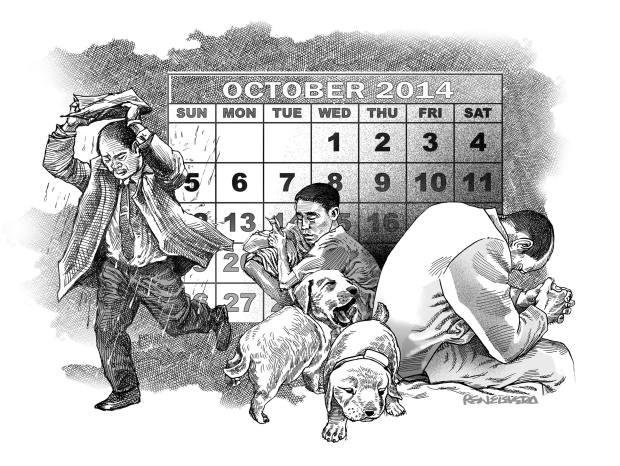
When I stepped outside, light rain, very fine drops of it, fell and had on my arms, neck and face the soothing effect of a massage. I made it past the service station half-smiling, then the bank, the pension house, the rotunda. There, in the counterflow of people, I thought I saw the same faces that I daily ran into years back when I was holding office in the area. The man who sold maps was still there. The sidewalk still offered puppies for sale, but these were not the same vendors and, of course, unless there was a time warp, not the same puppies.
I made a mental check, helped by a watch that had a perpetual calendar. It was noontime of the day after the middle of October.
October! That ambiguous month, the month of tension, the unendurable month. This is how Doris Lessing describes it. I only half-agreed, nodding just half a nod, more because I was afraid of what people might think, seeing me briskly footing the sidewalk and nodding vigorously.
Ambiguous, yes. But unendurable? I did not even know it was October. Not until it was beginning to end. The world seems unable to wait for November to arrive.
What I know is that October is endurable, it being as much part of time as the other months. But more than endurance, time signifies waiting, and waiting, of course, has at its core a yearning.
To Bernard Clairvaux, the waiting is both continuing and done. Like a poet he waits for the word. But more than a poet, he waits not just for the word but what’s more for the Word, a Person, God.
“I admit that the Word has also come to me… and has come many times. But although he has come to me, I have never been conscious of the moment of his coming. I perceived his presence. I remembered afterwards that he had been with me; sometimes I had a presentiment that he would come, but I was never conscious of his coming or his going. And where he comes from when he visits my soul, and where he goes, and by what means he enters and goes out, I admit that I do not know even now.”
I could use his words in describing October. I did not know that October had come, and I’m not sure if I would know when it would leave. The calendar might tell me, but will October really go?
Because October – time, in general – is both absence and presence.
“Tell us,” the Pharisees dared Jesus, “Is it right to pay taxes to Caesar or not?” Jesus, knowing their evil intent, said, “Show me the coin used for paying the tax.” When they brought him a denarius, he asked them, “Whose portrait is this? And whose inscription?” “Caesar’s,” they replied. Then he told them, “Give to Caesar what is Caesar’s, and to God what is God’s.”
This incident teaches me the attitude I should have towards time. In this passage from Matthew, I hear Jesus asking in the silence, “What month is it?” October, of course, I mutter to myself. And then he says, “Give to time what belongs to time, and to eternity what belongs to eternity.”
In other words, I should work and do the tasks that must be done before November, which will have its share of duties, too. And at the same time seek solitude and pray. For in prayer I will find that which transcends the calendar, and which recognizes only the present – which for me now happens to be noontime of the day after the middle of October. And which, when October finally goes, will be any moment I find myself. By then, who knows, I might again meet the seller of maps and the vendor of puppies, stirred by the scent of my passing into opening their eyes and catching a glimpse of me, as I walk on into the arms of the rain.